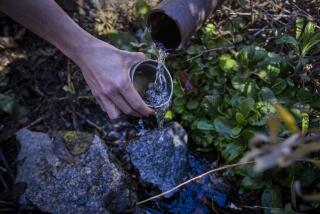U.S. is sued over drilling in Wyoming
As President Bush called for increased oil and gas drilling in the Rocky Mountain West and offshore, an environmental group launched a legal battle Wednesday against the Interior Department, saying the agency broke its promise to limit environmental damage from natural gas and oil development on the Pinedale Anticline, one of the country’s top reserves.
The Theodore Roosevelt Conservation Partnership, a nonprofit coalition of hunting, fishing and other organizations, filed suit against the Interior Department and the Bureau of Land Management in U.S. District Court in Washington. The suit alleges the BLM, a division of the Interior Department, “failed unequivocally” to comply with its plans to monitor and mitigate the effects of gas and oil drilling on wildlife across the Anticline and violated the National Environmental Policy Act and Federal Land Policy and Management Act.
The Pinedale Anticline, which includes about 198,000 acres of federal, state and private land in western Wyoming, is estimated to hold 21 trillion cubic feet of gas -- enough to heat 12.5 million homes for as many as 20 years.
The Bush administration has highlighted the Anticline, a scrub-land mesa south of Jackson, as a model for oil and gas exploration in the Rocky Mountain West. But massive development of oil and gas fields there has pushed up ozone levels and broken up the habitat of mule deer, pronghorn antelope and sage grouse, according to a study by the Wyoming Department of Environmental Quality and the environmental group that filed suit.
The project plan formulated eight years ago for the Anticline called for the development of about 700 well pads over a 10- to 15-year period. It included procedures to monitor and evaluate the effects of development. The suit alleges that a working group set up for that task held its first meeting in 2004, and has not met consistently thereafter.
“They haven’t been following the processes that they put in place that would address impacts to the natural resources of the area and would comply with their obligations under federal law,” said Katie McKalip, a spokeswoman for the conservation group.
Teresa Howes, a spokeswoman for the BLM, said she had not seen the lawsuit and could not directly address it, but added that the agency had been following procedures in the project plan.
The lawsuit comes at a time when three companies, Shell Exploration & Production, Ultra Resources, and Questar Exploration and Production, have asked to have seasonal restrictions removed to allow for expanded year-round drilling. Rules require development be shut down during wildlife breeding and migration.
The BLM is examining the request, part of a plan that would develop as many as 4,399 wells over 60 years on about 12,272 acres in the Anticline, Howes said. The plan, which is expected to be released in the next couple of weeks, would generate about $16 billion in royalties, half of which would go to Wyoming, she said. The Anticline has more than 800 wells, she said.
The Environmental Protection Agency’s regional administrator, Robert E. Roberts, said in a recent letter that the BLM’s proposed plan should be revised because it did not adequately analyze the effects of development on air quality and groundwater.
Paul Matheny, vice president for Questar Exploration’s Rockies region, said the new plan would allow for them to increase their output while better addressing environmental sensitivities. The company, which drills five months a year, funded a 2004 study that showed drilling year-round from a limited area, and using pipes instead of tanker trucks, was less environmentally destructive to the mule deer population.
“We really minimize the amount of habitat fragmentation and surface disturbance due to the drilling . . .” Matheny said. “Since then, the deer population stabilized and has started to rebound when we operate this way.”
A 2006 report showed the deer population declined 46% since 2000, the suit said. The study was industry-funded and performed by Western EcoSystems Technology Inc.
The suit does not ask the BLM to stop production in the Anticline. “We’re not opposed to public lands’ energy development,” McKalip said, “as long as it adheres to efforts to sustain fish and wildlife resources throughout the course of development activities.”
--
More to Read
Sign up for Essential California
The most important California stories and recommendations in your inbox every morning.
You may occasionally receive promotional content from the Los Angeles Times.










